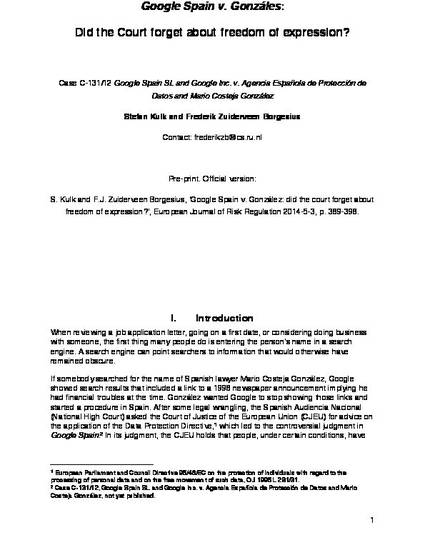
Article
Google Spain v. Gonzáles: Did the Court forget about freedom of expression?
European Journal of Risk Regulation
(2014)
Abstract
When reviewing a job application letter, going on a first date, or considering doing businesswith someone, the first thing many people do is entering the person’s name in a searchengine. A search engine can point searchers to information that would otherwise haveremained obscure.
If somebody searched for the name of Spanish lawyer Mario Costeja González, Googleshowed search results that included a link to a 1998 newspaper announcement implying hehad financial troubles at the time. González wanted Google to stop showing those links andstarted a procedure in Spain. After some legal wrangling, the Spanish Audiencia Nacional(National High Court) asked the Court of Justice of the European Union (CJEU) for advice onthe application of the Data Protection Directive, which led to the controversial judgment inGoogle Spain. In its judgment, the CJEU holds that people, under certain conditions, have the right to have search results for their name delisted. This right can also extend to lawfullypublished information.
In this note we mainly focus on the judgment’s implications for freedom of expression. Otheraspects, such as the jurisdictional aspects, are only briefly touched upon in this note. First,in sections II and III, the facts of the case and the CJEU’s judgment are summarised. Insection IV, we argue that the CJEU did not give enough attention to the right to freedom ofexpression. By seeing a search engine operator as a controller regarding the processing ofpersonal data on third party web pages, the CJEU assigns the operator the delicate task ofbalancing the fundamental rights at stake. However, such an operator may not be the mostappropriate party to balance the rights of all involved parties, in particular in cases wheresuch a balance is hard to strike. Furthermore, it is a departure from human rights doctrinethat according to the CJEU privacy and data protection rights override, “as a rule”, thepublic’s right to receive information. In addition, after the judgement it has become unclearwhether search engine operators have a legal basis for indexing websites that containspecial categories of data. We also discuss steps taken by Google to comply with thejudgment. Section V contains concluding remarks.
Disciplines
Publication Date
2014
Citation Information
Stefan Kulk and Frederik Zuiderveen Borgesius. "Google Spain v. Gonzáles: Did the Court forget about freedom of expression?" European Journal of Risk Regulation Vol. 2014-5 Iss. 3 (2014) p. 389 - 398 Available at: http://works.bepress.com/frederik-zuiderveenborgesius/45/